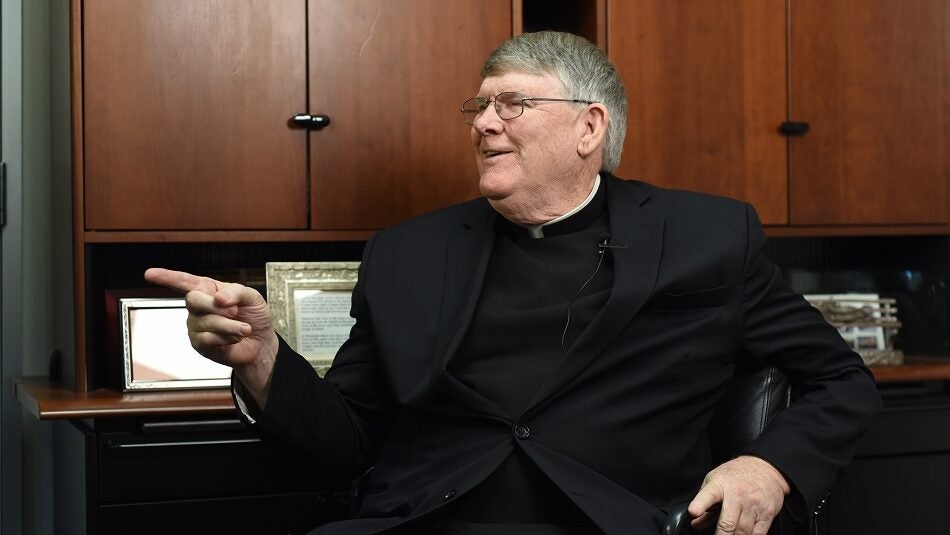

He’s been called the pastor for the poor.
Father John Enzler, president and CEO of Catholic Charities of the Archdiocese of Washington (CCADW), thinks the title speaks not only about him but also about Catholic Charities.
“This is the best job in the world,” Enzler said, “because we get to be people who take care of the poor. For me, it means I’m not a pastor of a parish anymore, I’m not leading a geographical area, but I have a population or a part of our community that needs service and care. I get to be pastor of that group.”
Serving people who are vulnerable and lacking in the necessities of life is the central focus of not only CCADW but also Catholic Charities in general, and it is what best expresses the ministry’s Catholic identity.
“We don’t ask the question of the people we serve, ‘Are you Catholic?'” Enzler said. “We don’t ask that. We ask, ‘How can we help you?’ We often say, we help people not because they’re Catholic — or non-Catholic — we help them because we’re Catholic. It’s part of who we are.”
New employees are introduced to CCADW’s core identity at orientation sessions, which are held every two weeks since the agency hires about 250 people per year, mostly due to transitions in staff. Enzler speaks at every orientation, and he emphasizes that while proselytizing is not allowed staff are expected to practice the values that form the foundation of the Catholic faith.
“I often say in orientation sessions, let’s help people see Jesus, see God, by the way we live every day. Our lives should demonstrate that we are preaching a message of love, care, concern, and good news.”
Enzler has a way of keeping that message of love and care in the forefront of his mind:
“Every person I see is for me a member of God’s family. Every person: the alcoholic, the mentally ill, the person who is addicted to whatever, refugees, people who are trafficked. In fact, I try to think of them as one of my own siblings or their children. I say, ‘What if that happened to my 15-year-old niece? What if it happened to my 24-year-old nephew?’ When I think like that, it changes my behavior. I want to treat them the way I want to be treated myself, and the way I want my siblings to be treated, and my nieces and nephews.”
Enzler tells his staff to keep two operating principles in mind when they are serving people who come to CCADW: (1) always try to say yes and (2) there are no closed doors. “I don’t want people here saying, ‘No, we can’t do that,” Enzler said. “I want them to say, ‘We don’t do that, but we know somebody who does.” The point is to get people the help they need. Therefore, never closing the door on someone looking for help goes hand in hand with trying to say yes, because another need might be identified and met.
“And wouldn’t it be great,” Enzler said, “if after helping someone, we say, ‘What else do you need?’ That’s an important question. They might need more. And it’s something we wouldn’t hesitate to ask a brother or a sister.”








